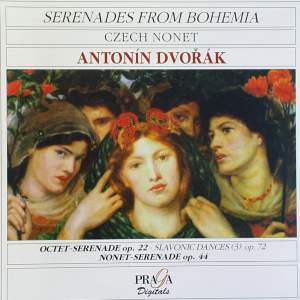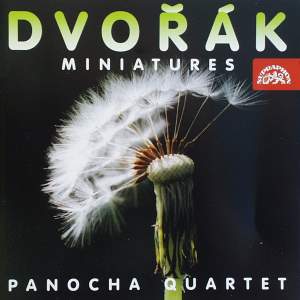|
Players coming and going
Dvorák rarities on record considered by Robert Anderson
|


The aural illustrations in this article use a proprietory RealNetworks format.
To listen, please download
realplayer G2.
|
Dvorák remains irresistible, whether he is arranging himself or
arranged by others. At first sight the whole of the Serenades CD would seem
to be arranged. The three Slavonic Dances of opus 72 were planned by Dvorak
for either piano duet or full orchestra. Here they are rejigged for double
wind quintet by Vlastimi Mares, oboist of the Prague Wind Quintet.  They
go splendidly, and would be equally happy on a combination of Jew's harp
and musical saw, for all I know. Nor is the opus 44 Serenade in D minor
presented in its usual format, having been tailored to the Czech Nonet by
Frantisek Hertl. This supplements Dvorák's scoring with horn and
upper strings. Perhaps the textures are clarified, yet this rather more
ambitious of Dvorák's two serenades cannot match the enchanting diversity
of opus 22 in E major. In this case it is the familiar string orchestra
version that is the arrangement. Dvorák originally conceived what
now seems totally idiomatic on strings for the Beethoven septet combination
with additional violin and piano but minus cello. The five movements sound
even fresher with the greater variety of timbre. The horn, for instance,
has a magnificent part, and it will be difficult to think of the waltz again
without a clarinet to launch it. (Click here to listen.) They
go splendidly, and would be equally happy on a combination of Jew's harp
and musical saw, for all I know. Nor is the opus 44 Serenade in D minor
presented in its usual format, having been tailored to the Czech Nonet by
Frantisek Hertl. This supplements Dvorák's scoring with horn and
upper strings. Perhaps the textures are clarified, yet this rather more
ambitious of Dvorák's two serenades cannot match the enchanting diversity
of opus 22 in E major. In this case it is the familiar string orchestra
version that is the arrangement. Dvorák originally conceived what
now seems totally idiomatic on strings for the Beethoven septet combination
with additional violin and piano but minus cello. The five movements sound
even fresher with the greater variety of timbre. The horn, for instance,
has a magnificent part, and it will be difficult to think of the waltz again
without a clarinet to launch it. (Click here to listen.)
The arrangements among the 'Miniatures' are by Dvorák himself.
Two string quartet waltzes come from the keyboard half dozen of opus 54,
and four 'Cypresses' are transcribed for a quartet of songs Dvorák
wrote in 1865.  The original cycle had 18 songs and twelve of them were
later arranged. Little of this music is familiar, and Dvorák has
to calculate to a nicety every phrase in pieces lasting mostly less than
three minutes. My favourites among them are slightly longer. The elegy that
concludes the opus 75a 'Miniatures' is a fine achievement, with its broken
violin phrases rising and falling in a tender lament of considerable emotional
power. (Click to listen.) Equally impressive, if
only for its contrapuntal skill, is the fourth of the 'Bagatelles' that
has Dvorák devise a canon as expressive as it seems effortless. (Click to listen.) The longest piece is an Allegro
vivace for string quartet that got no further than this opening movement.
There is virtuoso exploitation of some distinguished and promising material.
Why Dvorák set it aside and went on to beat a demanding deadline
with the opus 61 quartet is not at all clear. The original cycle had 18 songs and twelve of them were
later arranged. Little of this music is familiar, and Dvorák has
to calculate to a nicety every phrase in pieces lasting mostly less than
three minutes. My favourites among them are slightly longer. The elegy that
concludes the opus 75a 'Miniatures' is a fine achievement, with its broken
violin phrases rising and falling in a tender lament of considerable emotional
power. (Click to listen.) Equally impressive, if
only for its contrapuntal skill, is the fourth of the 'Bagatelles' that
has Dvorák devise a canon as expressive as it seems effortless. (Click to listen.) The longest piece is an Allegro
vivace for string quartet that got no further than this opening movement.
There is virtuoso exploitation of some distinguished and promising material.
Why Dvorák set it aside and went on to beat a demanding deadline
with the opus 61 quartet is not at all clear.
The two discs have a great variety of chamber combinations. The presence
of a conductor for the ten players of the Slavonic Dances maybe tips their
balance towards orchestral music. The Czech Nonet is more than 70 years
old, having been formed in 1924 to the shape of Spohr's nine-instrument
work, with five wind and four strings. The playing of their successors is
neat and crisp, with exemplary clarity maintained throughout. The Panocha
Quartet is more lyrical and expansive in style, phrasing this loveable music
with obvious affection. The players come and go. The Miniatures dispense
with cello, the Waltzes and Nocturne add a double bass (the former without
Dvorák's authority); but it is the Bagatelles that have the most
original grouping. Instead of the viola is the harmonium that stood in the
house of Josef Srb-Debrnov, for whose musical evenings Dvorák devised
the music. The harmonium is discrete almost to inaudibility, and emerges
only briefly from continuo shadows to a moment of comparative glory. The
tremulant stop that has instilled into so many church services a wobble
of almost unbearable poignancy is totally eschewed.
Copyright © Robert Anderson, June
27th 1999
| harmonia mundi PRD
250129 DDD 65'44
Czech Nonet, Prague Wind Quintet
Dvorák
Octet-Serenade, preliminary version of opus 22 in E; Slavonic
Dances opus 72 nos 2,3,8; Serenade in D minor opus 44, trascribed for nonet
ORDER
THIS CD FROM CROTCHET
Supraphon SU 3391-2 131 DDD
63'28
Panocha Quartet, with Jaroslav Tuma (harmonium), Pavel Nejtek
(double bass)
Dvorák
Miniatures opus 75a; Two Waltzes from opus 54; Bagatelles opus
47; Quartet Movement in F; Cypresses nos. 2,3,9,11; Nocturne in B opus 40
ORDER
THIS CD FROM CROTCHET |
<< Music & Vision
homepage More CD reviews >>
|